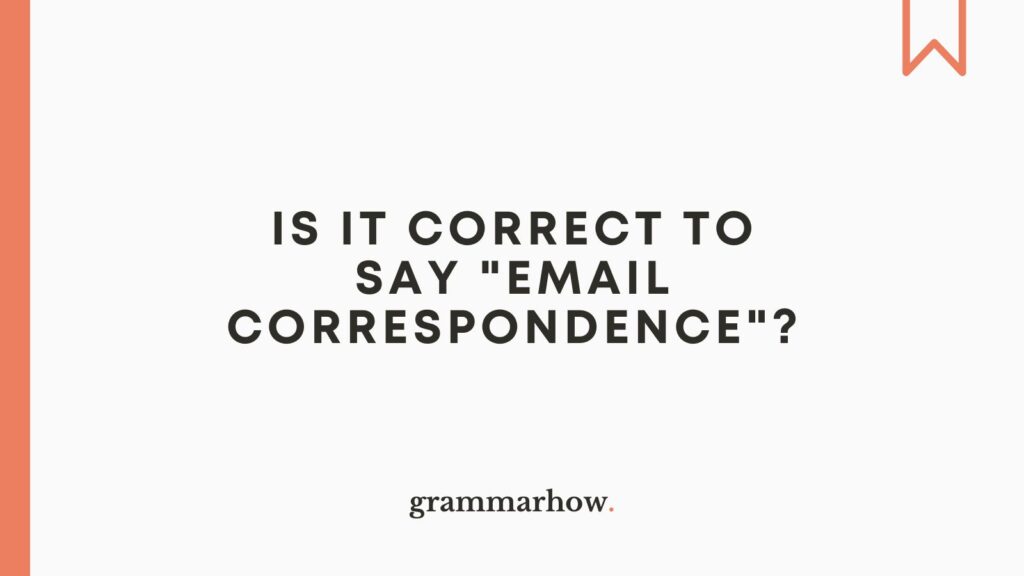Jobs often require you to send a lot of emails. Sometimes, you’ll need to refer back to those emails when talking to a colleague or client.
But what’s the best way to refer to the conversations you’ve had through email? We’ll let you know in the below article.
Is It Correct to Say “Email Correspondence”?
“Email correspondence” is a grammatically correct phrase with a coherent meaning. “Correspondence” is a form of communication that takes place via writing, and “emails” are a way to electronically exchange letters. Thus, this phrase just specifies the format through which your “correspondence” has taken place.
KEY TAKEAWAYS
- You can use the phrase “email correspondence” because it’s grammatically correct.
- You will often use this phrase in professional environments.
- Strong alternatives to this phrase include “email exchange” and “email conversation”.
Before the invention of email, you could safely assume that any “correspondence” was taking place via good old-fashioned pen, paper, and possibly raven. Now, there’s a bit more ambiguity involved, which might necessitate the need for specificity.
While this phrase is correct English, you could argue that the word “correspondence” is redundant, as we already know that this is what takes place via email. Take the sentences below as an example:
- If I can refer to what we discussed in our email correspondence yesterday.
- If I can refer to what we discussed in our email yesterday.
These two constructions imply slightly different meanings. “Our email correspondence” indicates that multiple emails have been exchanged, whereas “our email” sounds like it’s referring to only one email.
Additionally, you might want to use “email correspondence” in a sentence where you are discussing multiple forms of correspondence, like so:
- We’ve nailed down our strategy for the letters, now we just need to work on our email correspondence with customers.
You’re most likely to encounter this phrase in professional environments because tasks are frequently completed over email.
Now that we understand the phrase “email correspondence” and how to use it, we are going to look at some options for what to say instead of “email correspondence”. Additionally, we’ll show you what these phrases look like in a sentence.
Other Ways to Say “Email Correspondence”
Other ways to say “email correspondence” are “email conversation”, “email exchange” and, simply, “emails”. These are all synonyms that retain the meaning of the original phrase and are appropriate to use in a professional environment. Below, we’ll show you how to use them in a sentence.
1. Email Conversation
Another way to say “email correspondence” is “email conversation”.
In a conversation, two people exchange ideas and information. In the phrase “email conversation”, we specify that this exchange has happened through written text, electronically, rather than through spoken word.
Take a look at the example below:
- Person 1: We had a conversation about it yesterday.
- Person 2: I don’t remember speaking to you yesterday.
- Person 1: Sorry, I meant our email conversation.
Here’s another example sentence:
- We’ve had an email conversation, but we’ve never actually met.
2. Email Exchange
If you’re wondering how to say “email correspondence” in a different way, you could try “email exchange”.
The Cambridge Dictionary defines exchange as “the act of giving something to someone and them giving you something else”. Using the phrase “email exchange” highlights that you have engaged in an active conversation with someone via email, where you have both participated and contributed.
Here are two examples of how you can use “email exchange” in a sentence:
- We had a quick email exchange about it, but we haven’t come to any firm conclusions yet.
- I don’t want to meet him. We had one brief email exchange and it made me furious.
3. Emails
Another alternative to “email correspondence” is to simply say “emails”.
The difference between the phrase “email correspondence” and “email” is that the phrase indicates a back-and-forth including multiple emails. The below example sentences highlight this difference:
- We discussed this in our email correspondence.
- We discussed this in our email.
To resolve this difference, you can just use the plural version of “email”:
- We discussed this in our emails.
We now know that we’re discussing multiple emails, as opposed to just one email composed by a group of people.
This word is still less specific than “email correspondence” because it doesn’t have the same established meaning of being an exchange with at least two participants. Consequently, “our emails” could still all be coming from one source.

Martin holds a Master’s degree in Finance and International Business. He has six years of experience in professional communication with clients, executives, and colleagues. Furthermore, he has teaching experience from Aarhus University. Martin has been featured as an expert in communication and teaching on Forbes and Shopify. Read more about Martin here.


